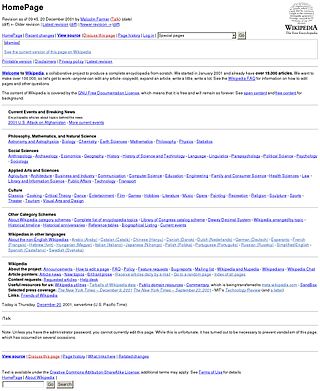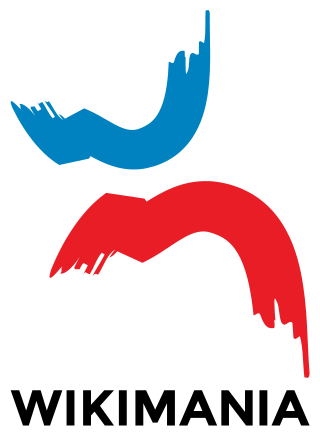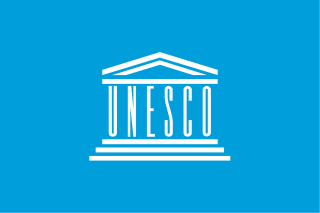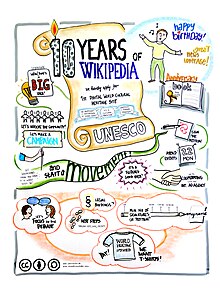
Wikipedia, a free-content online encyclopedia written and maintained by a community of volunteers known as Wikipedians, began with its first edit on 15 January 2001, two days after the domain was registered. It grew out of Nupedia, a more structured free encyclopedia, as a way to allow easier and faster drafting of articles and translations.

World Heritage Sites are landmarks and areas with legal protection under an international treaty administered by UNESCO for having cultural, historical, or scientific significance. The sites are judged to contain "cultural and natural heritage around the world considered to be of outstanding value to humanity".

Wiktionary is a multilingual, web-based project to create a free content dictionary of terms in all natural languages and in a number of artificial languages. These entries may contain definitions, images for illustration, pronunciations, etymologies, inflections, usage examples, quotations, related terms, and translations of terms into other languages, among other features. It is collaboratively edited via a wiki. Its name is a portmanteau of the words wiki and dictionary. It is available in 195 languages and in Simple English. Like its sister project Wikipedia, Wiktionary is run by the Wikimedia Foundation, and is written collaboratively by volunteers, dubbed "Wiktionarians". Its wiki software, MediaWiki, allows almost anyone with access to the website to create and edit entries.

Cultural diversity is the quality of diverse or different cultures, as opposed to monoculture. It has a variety of meanings in different contexts, sometimes applying to cultural products like art works in museums or entertainment available online, and sometimes applying to the variety of human cultures or traditions in a specific region, or in the world as a whole. It can also refer to the inclusion of different cultural perspectives in an organization or society.

The Rice Terraces of the Philippine Cordilleras are a World Heritage Site consisting of a complex of rice terraces on the island of Luzon in the Philippines. They were inscribed on the UNESCO World Heritage List in 1995, the first-ever property to be included in the cultural landscape category of the World Heritage List. This inscription has five sites: the Batad Rice Terraces and Bangaan Rice Terraces, Mayoyao Rice Terraces, Hungduan Rice Terraces and Nagacadan Rice Terraces, all in Ifugao Province. The Ifugao Rice Terraces reach a higher altitude and were built on steeper slopes than many other terraces. The Ifugao complex of stone or mud walls and the careful carving of the natural contours of hills and mountains combine to make terraced pond fields, coupled with the development of intricate irrigation systems, harvesting water from the forests of the mountain tops, and an elaborate farming system.

The World Heritage Committee is a committee of the United Nations Educational, Scientific and Cultural Organization that selects the sites to be listed as UNESCO World Heritage Sites, including the World Heritage List and the List of World Heritage in Danger, defines the use of the World Heritage Fund and allocates financial assistance upon requests from States Parties. It comprises representatives from 21 state parties that are elected by the General Assembly of States Parties for a four-year term. These parties vote on decisions and proposals related to the World Heritage Convention and World Heritage List.

The World Heritage Convention, formally the Convention Concerning the Protection of the World Cultural and Natural Heritage, is an international treaty signed on 23 November 1972, which created the World Heritage Sites, with the primary goals of nature conservation and the preservation and security of cultural properties. The convention, a signed document of international agreement, guides the work of the World Heritage Committee. It was developed over a seven-year period (1965–1972).

The Wikimedia Foundation, Inc., abbreviated WMF, is an American 501(c)(3) nonprofit organization headquartered in San Francisco, California, and registered there as a charitable foundation. It is the host of Wikipedia, the seventh most visited website in the world. It also hosts fourteen related open collaboration projects, and supports the development of MediaWiki, the wiki software which underpins them all. The Foundation was established in 2003 in St. Petersburg, Florida by Jimmy Wales, as a non-profit way to fund these wiki projects.

Wikimania is the Wikimedia movement's annual conference, organized by volunteers and hosted by the Wikimedia Foundation. Topics of presentations and discussions include Wikimedia projects such as Wikipedia, other wikis, open-source software, free knowledge and free content, and social and technical aspects related to these topics.

Global Memory Net (GMNet) is a world digital library of cultural, historical, and heritage image collections. It is directed by Ching-chih Chen, Professor Emeritus of Simmons College, Boston, Massachusetts and supported by the National Science Foundation (NSF)'s International Digital Library Program (IDLP). The goal of GMNet is to provide a global collaborative network that provides universal access to educational resources to a worldwide audience. GMNet provides multilingual and multimedia content and retrieval, as well as links directly to major resources, such as OCLC, Internet Archive, Million Book Project, and Google.

The United Nations Educational, Scientific and Cultural Organization is a specialized agency of the United Nations (UN) with the aim of promoting world peace and security through international cooperation in education, arts, sciences and culture. It has 194 member states and 12 associate members, as well as partners in the non-governmental, intergovernmental and private sector. Headquartered in Paris, France, UNESCO has 53 regional field offices and 199 national commissions.

World Heritage Memory Net (WHMNet), a partnership project with UNESCO World Heritage Centre, is a global digital library of cultural, historical, and heritage multimedia collections related to the current 962 UNESCO World Heritage Sites of 157 State Parties. Of these 962 sites, 745 are cultural sites, 188 natural, and 29 mixed and 38 of the total 962 are in danger. WHMNet was officially launched April 29, 2011, and can be thought of as “the world’s heritage at your fingertips.”

UNESCO Global Geoparks (UGGp) are geoparks certified by the UNESCO Global Geoparks Council as meeting all the requirements for belonging to the Global Geoparks Network (GGN). The GGN is both a network of geoparks and the agency of the United Nations Educational, Scientific and Cultural Organization (UNESCO). that administers the network.

The Zenith of Iron Age Shetland is a combination of three sites in Shetland that have applied to be on the Scottish "Tentative List" of possible nominations for the UNESCO World Heritage Programme list of sites of outstanding cultural or natural importance to the common heritage of humankind. The application was made by the Shetland Amenity Trust in 2010, and in 2011 the site became one of 11 successful UK applications to join the Tentative List, three of them from Scotland.

The Wikipedia community, collectively and individually known as Wikipedians, is an online community of volunteers who create and maintain Wikipedia, an online encyclopedia. Since August 2012, the word "Wikipedian" has been an Oxford Dictionary entry. Wikipedians may or may not consider themselves part of the Wikimedia movement, a global network of volunteer contributors to Wikipedia and other related projects hosted by the Wikimedia Foundation.

WikiConference India is a national Wikipedia conference organised in India. The first WikiConference India conference was held in November 2011, in Mumbai, the capital of the Indian state of Maharashtra. It was organised by the Mumbai Wikipedia community in partnership with Wikimedia India Chapter with the support of the Wikimedia Foundation. The conference is positioned as the annual national flagship event for Wikimedia in India and is open to participation from citizens of all nations. The focus is on matters concerning India on Wikipedia projects and other sister projects in English and other Indian folk languages. WikiConference India 2023 took place in Hyderabad from 28 to 30 April 2023. Wikiconference India 2025 is in the planning phase.

An edit-a-thon is an event where some editors of online communities such as Wikipedia, OpenStreetMap, and LocalWiki edit and improve a specific topic or type of content. The events typically include basic editing training for new editors and may be combined with a more general social meetup. The word is a portmanteau of "edit" and "marathon". An edit-a-thon can either be "in-person" or online or a blended version of both. If it is not in-person, it is usually called a "virtual edit-a-thon" or "online edit-a-thon".
Biosphere reserves are areas comprising terrestrial, marine and coastal ecosystems. The biosphere reserve title is handed over by UNESCO. Each reserve promotes solutions reconciling the conservation of biodiversity with its sustainable use. Biosphere reserves are 'Science for Sustainability support sites' – special places for testing interdisciplinary approaches to understanding and managing changes and interactions between social and ecological systems, including conflict prevention and management of biodiversity. Biosphere reserves are nominated by national governments and remain under the sovereign jurisdiction of the states where they are located. Their status is internationally recognized.















